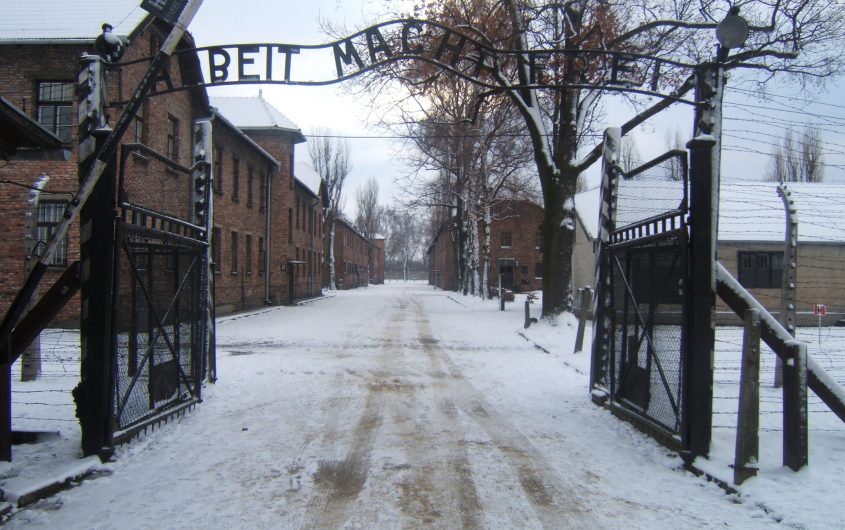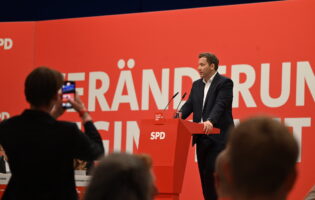
Public Domain via Wikimedia Commons
Combating Selective Memory and Complacency

Rachel Seavey
MIT Senseable City Lab,
Rachel Seavey works as part of the management team at the MIT Senseable City Lab, where she assists a variety of international students and scholars, while managing the Lab’s admissions process, communications, and internal operations. As part of her role, she is responsible for helping coordinate the Lab’s annual Forum on Future Cities conference, which was cohosted by the World Economic Forum, the World Bank, and Mahindra in 2016. Rachel is a member of the Council of the German American Conference at Harvard e.V. and served as a CoChair for the German American Conference at Harvard in 2017. She also has experience working with U.S. and international students in the field of Student Affairs with offices of First Year Experience, Study Abroad, and Service-Learning. Before coming to MIT, Rachel oversaw 151 students studying abroad in Melbourne, Australia as an Assistant Site Director for Northeastern University’s N.U. in Program. She holds a Bachelor’s degree in Classics and a Master’s degree in Higher Education in Student Affairs.
She is a 2017-2018 participant in AICGS’ project “A German-American Dialogue of the Next Generation: Global Responsibility, Joint Engagement,” sponsored by the Transatlantik-Programm der Bundesrepublik Deutschland aus Mitteln des European Recovery Program (ERP) des Bundesministeriums für Wirtschaft und Energie (BMWi).
On Thursday, April 9, 2018, the Conference on Jewish Material Claims Against Germany announced shocking news: a survey conducted by Schoen Consulting found that in the United States, the collective memory of the Holocaust and its atrocities has significantly faded, particularly with youth populations. In fact, the study found that
- almost half of adults and millennials in the United States could not name one concentration camp,
- that two-thirds of millennials did not know what Auschwitz was,
- one-third of all Americans and over four-in-ten millennials believed that significantly less people were killed than the factual number
- that most Americans had not visited a Holocaust museum, and
- had never interacted with a Holocaust survivor.
Responses to this study spread rapidly throughout social media, resulting in op-eds, articles, and reactions from The New York Times, the Huffington Post, Vice News, as well as educational centers, nonprofit organizations, and private channels. In light of this news, many have since asked: How is this possible? Where have we gone wrong? What are we NOT doing? How do we educate our youth to ensure that these events never slip from memory and even more importantly, never happen again?
Such alarm is beyond warranted, especially when juxtaposed with recent global crises. For example, the Anti-Defamation League found that anti-Semitism in the United States has risen to 57 percent from 2016 to 2017, a trend mirrored by many countries throughout the world. In April 2018, President Bashar al-Assad of Syria was accused (once again), of using Sarin or a similar gas on his people—the same chemical rampantly used by the Nazi Party. And yet, while historical memory of the Holocaust fades, acknowledgement of World War II has not. Christopher Nolan’s film Dunkirk grossed over $500 million at the box office in 2017 and was recognized as not just a breakthrough hit, but the “highest grossing WWII film in history” and many pieces of fiction, such as All the Light We Cannot See, Lilac Girls, and The Nightingale have dominated bookselling lists, with major motion picture adaptations in the pipeline. These are strange phenomena to consider in parallel with the news from Schoen Consulting. How can these stories surge in popularity while others slip into the dark? Have we become selective in our memory of the past?
While I am not Jewish, the crimes of the Second World War were instilled in my mind at a young age. My grandfather served in the war and my father made it a point to talk about this period of time with my brothers and me. He had us read memoirs and novels, watch movies and historical programs, and visit WWII memorials to understand why our grandfather had left his home in Boston to fight in France. In sixth grade, my math teacher and a concentration camp survivor rolled up his sleeve to show our class a curious collection of marks tattooed on his arm. Instead of teaching us math that day, he spent the whole class sharing the meaning behind those marks. And the teachers and administrators in my primary and secondary schools made a concerted effort to incorporate Holocaust literature into our educational programming. Looking back, I am grateful for these lessons, however, I realize that most children today will not have a living grandparent, relative, or teacher who experienced these events firsthand.
Civil society actors have an increased responsibility to preserve historical memory, so that future generations are cognizant of past tragedies and the reasons they transpired.
As the number of living WWII survivors and veterans diminish with time, civil society actors have an increased responsibility to preserve historical memory, so that future generations are cognizant of past tragedies and the reasons they transpired. Civil society actors can do so through educational programming; by organizing young people to visit to memorials and sites of remembrance; through literature, art, photography, and film; through visits with survivors and victims; through thoughtful dialogue and reflection; and with space to dispel myths, challenge prejudice, and shed light on inaccurate knowledge through a conscious and constant dedication to keep the past relevant today. It is all too easy to think that enough has already been done or to assume that “everyone already knows” but the results from Schoen Consulting indicate otherwise. Our failure to remember not only insults casualties and survivors; it is dangerous for us all. There is a reason why the phrase “those who ignore history are doomed to repeat it” (although misquoted from its original source) is one of the most cited of all time—the warning is true. The decision to remember, and remember accurately, honors the lives lost, affirms the experience of survivors, enables healing and reconciliation (both personal and public), and is the greatest measure we can take to prevent similar tragedies from ever happening again.









